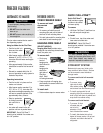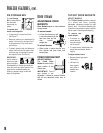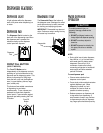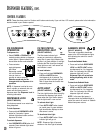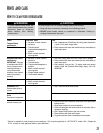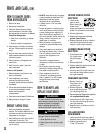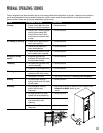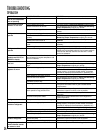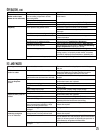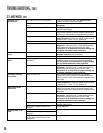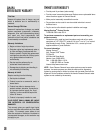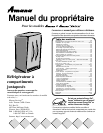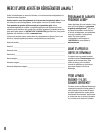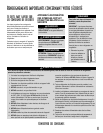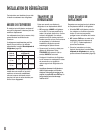
25
Water appears cloudy
Particles in water
and/or ice cubes.
No indicator lights
are lit on dispenser
control
Neither ice nor water is
dispensed when pads are
pushed
Ice maker is not
producing enough ice
or ice is malformed
Ice and water
Air or air bubbles in water.
Carbon dust from water filter cartridge.
Concentrations of minerals in water will form
particles when water becomes frozen and melts.
Freezer door is not closed.
Refrigerator is not plugged in.
Fuse is blown, or circuit breaker needs to be
reset.
Power outage has occurred.
Refrigerator is in Sabbath Mode (select models).
Freezer door is not closed.
Controls are in lock mode.
Water tank is filling.
Ice maker or ice maker-equipped refrigerator
has just recently been installed or a large
amount of ice has just been used.
Water filter is clogged or needs to be
changed.
Ice maker has just recently been installed, or
a large amount of ice has just been used.
Water pressure is too low.
Water filter is clogged or needs to be
changed.
This is normal when first using dispenser and will disappear
with use.
Initial water ejected through cartridge may contain harmless
carbon dust flushed from cartridge. Particles are safe for
consumption. Will disappear after the first few uses.
Particles are not harmful and naturally occur in water
supplies.
Verify that freezer door is closed. Power is removed from the
control when freezer door is opened.
Plug in refrigerator.
Replace any blown fuses. Check circuit breakers for any
tripped circuits.
Call local power company listing to report outage.
See Dispenser Features section for further information.
Verify that freezer door is closed. Power is removed from the
control when freezer door is opened.
See control instructions in Dispenser Features.
At initial use, there is an approximate 45-second delay in
dispensing while the internal water tank is filling.
Wait 24 hours for ice production to begin and for ice maker to
restock after emptied.
Change water filter.
Wait 24 hours for ice production to begin and for ice maker to
restock after emptied.
Low water pressure can cause valve to leak. Water pressure
must be between 20 to 100 pounds per square inch to function
properly. A minimum pressure of 35 pounds per square inch is
recommended for refrigerators with water filters.
Change water filter.
PROBLEM
Temperature-controlled
drawer and/or crisper
drawer do not close freely
Refrigerator runs too
frequently
POSSIBLE CAUSE
Contents of drawer, or positioning of items in
the surrounding compartment could be
obstructing drawer
Drawer is not in proper position
Refrigerator is not level.
Drawer channels are dirty or need treatment.
Doors have been opened frequently or have
been opened for long periods of time.
Humidity or heat in surrounding area is high.
Food has recently been added.
Refrigerator is exposed to heat by
environment or by appliances nearby.
Condenser coils are dirty.
Controls need to be adjusted.
Door is not closing properly
Door gaskets are not sealing properly.
SOLUTION
See drawer section in Fresh Food Features to properly
install drawers.
See leveling instructions in Installing Your Refrigerator.
Apply a thin layer of petroleum jelly to drawer channels.
Reduce time door is open. Organize food items efficiently to
assure door is open for as short a time as possible.
Allow interior environment to adjust for period the door has
been open.
Normal operation.
Allow time for recently-added food to reach refrigerator or
freezer temperature.
Evaluate your refrigerator’s environment. See location
selection section in Installing Your Refrigerator.
Clean according to cleaning instructions in Hints and Care.
See temperature controls section in Setting and Maintaining
Proper Temperatures to adjust your controls.
See leveling instructions in Installing Your Refrigerator.
Check for internal obstructions that are keeping door from
closing properly (i.e. improperly closed drawers, ice buckets,
oversized or improperly stored containers or foodstuffs, etc.).
Clean according to cleaning instructions in Hints and Care.
Operation, cont.



